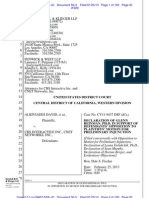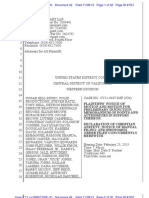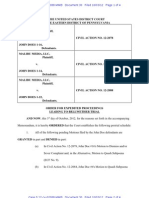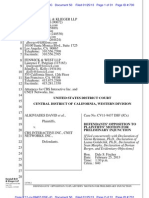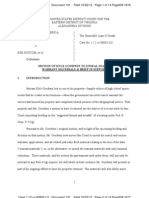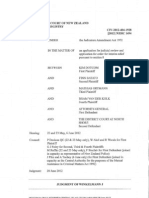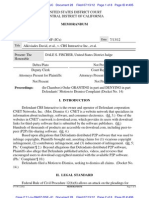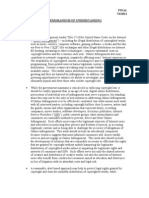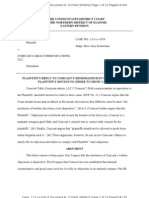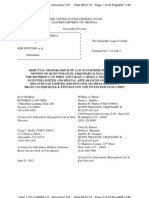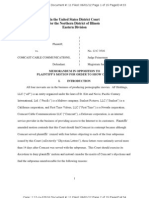Professional Documents
Culture Documents
Common Position On Copyright 28sept11 - EN
Uploaded by
TorrentFreak_Original Title
Copyright
Available Formats
Share this document
Did you find this document useful?
Is this content inappropriate?
Report this DocumentCopyright:
Available Formats
Common Position On Copyright 28sept11 - EN
Uploaded by
TorrentFreak_Copyright:
Available Formats
Creation and Copyright in the Digital Era
Preamble: Definition of "authors right" The rights of authors include the economic rights in the work and the moral right of author. However, the moral rights regime should not prevent the use of the work as long as the author is cited and has the opportunity to comment on the use made of her work, and as long as it is ethically acceptable. Changes as opportunities 1. In the past, technology has been many times a challenge for modes of cultural production, their economic dimensions, and the existing legal framework. As new technologies often find existing relationships unprepared for changes, they become the vehicle for transformation and further development of existing relations. With the digital technologies and the Internet, the production, dissemination, access and use of cultural productions changed greatly during the past 20 years. Consequently, social, legal and economic settings are shaken up and important transformations are taking place. 2. We believe these transformations must be seized as opportunities to increase access to cultural productions for all while finding sustainable ways to improve the financing of creation and the status of those who are creating, creators and artists. 3. Cultural production and access to knowledge are key to the participation of citizens to the democratic functioning of our societies; they also are a great source of economic development. We believe it is possible to accompany todays technical transformations, without adopting a conservative approach, to serve both social and economic advances in line with article 27 paragraph 1 and 2 of the Universal Declaration of Human Rights which states that "(1) Everyone has the right freely to participate in the cultural life of the community, to enjoy the arts and to share in scientific advancement and its benefits, and (2) Everyone has the right to the protection of the moral and material interests resulting from any scientific, literary or artistic production of which he is the author". 4. The task for policy makers and politicians is not to protect old business models or to invent new ones, but it is, in the context of adapting to the new digital situation, to provide a proper regulation framework for artists and creators, who are the at the beginning of the value chain of creation to get better remuneration and recognition for their work. The need to reframe the debate 5. Distinction between commercial and non commercial use of copyright material always needs to be made: users making financial benefits from the exploitation of copyrighted works should remunerate right holders accordingly, while users making no financial benefits should be free to use copyrighted works provided that they quote the authors. Although legal actions should sanction violations of copyright with commercial intent, we reject policies and measures only based on repression and control as so-called solutions to address the current social and economic changes introduced by digital technologies and the Internet. They too often carry the risk of arbitrary deprivation of individual liberty, while repressive measures and policies such as three strike type laws more and more show inefficient, financially costly and inappropriate to respond properly to the transformations that affect creation.
www.greens-efa.eu
Greens/EFA position paper Creation and Copyright in the Digital Era
6. We refuse responses to the current social transformation that focus either on the escalation of intellectual property rights and enforcement of them or the rejection of copyright rules altogether. We believe there is not one-size fit all solution to respond to the current transformations of society, as far as creation is concerned, or how to make the best of them both socially and economically. More than one regulatory tool and one field of law need to be taken into account and involved in the design of the best and most equitable framework to ensure and foster creation. 7. Presenting consumers and artists as opponents in conflict with each other ignores their common interests and the reality that individuals often enough are one and the other alternatively or simultaneously. Both consumers and artists have a fundamental interest in maintaining production conditions for creators which allow for independent, high quality journalism, film-making, composing, photography or authorship of academic literature or novels that is not only dependent on state subsidies, direct corporate sponsorship or donations. 8. If not always, often enough creation cannot flourish without economic means and depends on creators and artists capacity to be in touch with and aware of existing intellectual and cultural productions. Therefore, it is essential to make sure that resources (financial, but also content and ideas) are accessible to creators and artists. To do so, all sources of financing need to be take in consideration (public spending, market revenues, direct contributions from individuals through flat rate or crowd culture mechanisms for example) to enable cultural production. 9. Copyright is a legal tool that was forged in time and that changed according to the evolution of creation and techniques. It was built to offer a balance between the interests of creators and those of the public, and as such it incorporates protections and limitations or exceptions. It is a tool, among others, dedicated to promote creation, and should never be looked as an end in itself. 10. The recognition of the moral rights of artists and creators cannot be alienated or ignored, whatever the technological forms of production, reproduction, dissemination of work are. In a context where the production and dissemination of cultural goods is increased by todays technical possibilities, it is essential that the identification, acknowledgement and registering of the author(s) of creative work be performed. This implies the development and implementation of new tools, data basis and practices, that should be promoted and supported by institutions. 11. We believe various options can be designed in the context of in the digital era to allow the necessary recognition of authorship, a better remuneration of the artists, while making the most of the technical possibilities in terms of exchange and sharing of cultural productions. To chart these paths, in order to identify and elaborate the most relevant actions to take, it is the situation of artists and creatives who are creating that needs to be taken as a starting point. Improving the situation of artists and creators 12. The position and status of the majority of the artists are often precarious. This is a reality that pre-existed the advent of digital technologies. Their financial resources and remuneration come in most of the cases from multiple sources wages, grants, patronage, copyright, parallel professional activities, unemployment benefits, etc. and are often irregular and unpredictable. Wage-earners in the culture sector often have several employers, including employers outside of the cultural sphere, carry out several jobs, and are concurrently working under different contracts. Copyright, as a source of income, is of very variable importance depending on the sector of creation considered. However, for a majority of artists and creators, it only represents a small part of their income. 13. To improve the condition of artists requires to change contract law at the European level in order to stop buy out contracts and to put artists and creators in a better negotiating position when facing the entertainment oligopolies that dominate the market. Consumers are also citizens and therefore have a responsibility towards the artists and creators of whom they enjoy and consume the works. 14. Supporting artists in the digital age require to provide them with tools, information, training, and services to make the best of a new environment many of them do not master the way ITC professionals do, but that can offer them a lot of opportunities, to promote their work, to sell their productions, to advertise their performances, etc.
www.greens-efa.eu
Greens/EFA position paper Creation and Copyright in the Digital Era
15. If debates over digital technologies brought to light the precarious condition of artists, collecting and redistribution systems are problematic and unfair in most countries to a majority of the artists and creators regardless of the existence of the information and communications technologies (ICTs). Thus, one of the key action to undertake, and one of the most urgent, is a European reform of the collecting and distribution systems in order to guaranty fair, steady and transparent redistribution of revenues from the exploitation, be it digital or not, of copyrighted artistic work. Industrial transformations 16. Understanding and accompanying the transformations in creation and consumption of cultural production impose to embrace it as a whole. The production as well as the consumption of culture (in quantity and money) increased greatly in the past 20 years, allowing huge profits for monopolies like Google and Apple, but not for the artists. Some modes of consumption are less and less popular (physical medium such as tapes, CDs, DVDs, bluerays, etc.), others develop or become increasingly popular (streaming, downloading, live concerts, watching movies in theatres, on line games, on demand tv, e-books, etc.). 17. Dematerialisation is leading to changes which are likely to affect many industries, be it the emergence and the disappearance of various industry players, the loss, creation and transfer of value and industry restructuring, the emergence of new business models. Value chains are transforming, some intermediaries are disappearing, new professions are emerging while others are still necessary. 18. In a context where human exchanges and communication depend on sophisticated and fast changing technologies, interoperability between formats and reader hard-ware is essential to democratic access to cultural production as well as to economic activities. This technical feature should be endorsed and implemented by European institutions and promoted by European regulations. 19- Non commercial sharing between individuals should be allowed, for instance by widening the scope of the existing private copying exception. If and when it can be proved that the production of cultural goods is compromised by non-commercial sharing, a content flat rate or another mechanism for broadband users may be envisaged. Such a mechanism must not invade the privacy of internet users. The distribution of revenues should favour poor and starting creators. 20. We believe it is key to strengthen the public domain so that it is a resource for education (in the broad sense) of our citizen and for creation. 21. Finally, freedom to operate, to experiment, to challenge existing institutions and business models, and technological constraints and methods, is important, not only in terms of creative activity, but in terms of creating value, expanding the possibilities of knowledge and its impact on society, and in allowing society to grow and prosper. The Internet itself would not have existed without this freedom to operate, and the conditions which permitted this to happen should not be foreclosed. Therefore we need to guaranty net neutrality. Reforming copyright 22. We do support Creative Commons as a good possibility for creatives to share their works when ever wanted. 23. Up until twenty years ago, copyright was hardly anything that concerned ordinary people. The rules about exclusivity on the production of copies where aimed at commercial actors, who had the means to, for example, print books or press records. Private citizens who wanted to copy a poem and send to their loved one, or copy a record to cassette and give it to a friend, did not have to worry about being in breach of copyright. In practice, anything you had the technical means to do as a normal person, you could do without risk of any punishment. But today, copyright has evolved to a position where it imposes serious restrictions on what ordinary citizens can do in their every-day life. As technological progress has made it easier for ordinary people to enjoy and share culture, copyright legislation has moved in the opposite direction.
www.greens-efa.eu
Greens/EFA position paper Creation and Copyright in the Digital Era
We want to restore copyright to its origins, and make absolutely clear that it only regulates copying for commercial purposes. To share copies, or otherwise spread or make use of use somebody elses copyrighted work, should never be prohibited if it is done non-commercially and without a profit motive. Peer-to-peer file sharing is an example of such an activity that should be legal. 24. DRM is an acronym for "Digital Rights Management", or "Digital Restrictions Management". The term is used to denote a number of different technologies that all aim to restrict consumers and citizens ability use and copy works, even when they have a legal right to do so. It must always be legal to circumvent DRM restrictions, and we should consider introducing a ban in the consumer rights legislation on DRM technologies that restrict legal uses of a work. There is no point in having our parliaments introduce a balanced and reasonable copyright legislation, if at the same time we allow the big multinational corporations to write their own laws, and enforce them through technical means. 25. Much of todays entertainment industry is built on the commercial exclusivity on copyrighted works. This, we want to preserve. But todays protection times life plus 70 years are absurd. No investor would even look at a business case where the time to pay-back was that long. We want to shorten the protection time to something that is reasonable from both societys and an investors point of view, and propose 20 years from publication. 26. Today, works that are still in copyright but where it is impossible or difficult to locate the rights owner is a major problem. The majority of these works have little or no commercial value, but since they are still covered by copyright, they cannot be reused or distributed because there is nobody to ask for permission. Rights owners who want to continue to exercise their commercial exclusivity on work they already produced should register them within 5 years. This would greatly reduce the number of orphan works and facilitate diligent search. 27. The problem of orphan works urgently needs to be solved. It is important to be aware of the sectoral differences. For archives, libraries and especially (public) broadcasters extended collective licensing is the preferable solution. However, the condition of a diligent search has to be feasible and shall not lead to additional administrative and bureaucratic work and expenses. A general exception in copyright for orphan works is not desirable, but an exception for libraries etc. in the frame of a "LEX-Europeana" should be considered. 28. From now, and within a time frame of 5 years after the production, registration of copyright work should be compulsory for authors to enjoy commercial exclusivity. This would greatly limit the existence orphan works in the future. 29. Todays ever more restrictive copyright legislation and practice is a major obstacle to musicians, film makers, and other artists who want to create new works by reusing parts of existing works. We want to change this by introducing clear exceptions and limitations to allow remixes and parodies, as well as quotation rights for sound and audiovisual material modelled after the quotation rights that already exist for text. 30. The book famine experienced by visually impaired and print -disabled people needs to be addressed. The Commission and Member States have obligations under the UN Convention on the Rights of Persons with Disabilities to take all appropriate measures to ensure that people with disabilities enjoy access to cultural materials in accessible formats, and to ensure that laws protecting IPR do not constitute an unreasonable or discriminatory barrier to access by people with disabilities to cultural materials. As required by the European Parliament in its report on report, "Unlocking the potential of the cultural and creative industries", adopted on May 12, 2011, the Commission should "work actively and positively within the World Intellectual Property Organisation (WIPO) to agree on a binding legal norm based on the treaty proposal drafted by the World Blind Union and tabled at WIPO in 2009".
Amended version, September 6th, 2011 Consolidated version after vote of September 28th, 2011
www.greens-efa.eu
You might also like
- A Heartbreaking Work Of Staggering Genius: A Memoir Based on a True StoryFrom EverandA Heartbreaking Work Of Staggering Genius: A Memoir Based on a True StoryRating: 3.5 out of 5 stars3.5/5 (231)
- The Sympathizer: A Novel (Pulitzer Prize for Fiction)From EverandThe Sympathizer: A Novel (Pulitzer Prize for Fiction)Rating: 4.5 out of 5 stars4.5/5 (119)
- Never Split the Difference: Negotiating As If Your Life Depended On ItFrom EverandNever Split the Difference: Negotiating As If Your Life Depended On ItRating: 4.5 out of 5 stars4.5/5 (838)
- Devil in the Grove: Thurgood Marshall, the Groveland Boys, and the Dawn of a New AmericaFrom EverandDevil in the Grove: Thurgood Marshall, the Groveland Boys, and the Dawn of a New AmericaRating: 4.5 out of 5 stars4.5/5 (265)
- The Little Book of Hygge: Danish Secrets to Happy LivingFrom EverandThe Little Book of Hygge: Danish Secrets to Happy LivingRating: 3.5 out of 5 stars3.5/5 (399)
- Grit: The Power of Passion and PerseveranceFrom EverandGrit: The Power of Passion and PerseveranceRating: 4 out of 5 stars4/5 (587)
- The World Is Flat 3.0: A Brief History of the Twenty-first CenturyFrom EverandThe World Is Flat 3.0: A Brief History of the Twenty-first CenturyRating: 3.5 out of 5 stars3.5/5 (2219)
- The Subtle Art of Not Giving a F*ck: A Counterintuitive Approach to Living a Good LifeFrom EverandThe Subtle Art of Not Giving a F*ck: A Counterintuitive Approach to Living a Good LifeRating: 4 out of 5 stars4/5 (5794)
- Team of Rivals: The Political Genius of Abraham LincolnFrom EverandTeam of Rivals: The Political Genius of Abraham LincolnRating: 4.5 out of 5 stars4.5/5 (234)
- Shoe Dog: A Memoir by the Creator of NikeFrom EverandShoe Dog: A Memoir by the Creator of NikeRating: 4.5 out of 5 stars4.5/5 (537)
- The Emperor of All Maladies: A Biography of CancerFrom EverandThe Emperor of All Maladies: A Biography of CancerRating: 4.5 out of 5 stars4.5/5 (271)
- The Gifts of Imperfection: Let Go of Who You Think You're Supposed to Be and Embrace Who You AreFrom EverandThe Gifts of Imperfection: Let Go of Who You Think You're Supposed to Be and Embrace Who You AreRating: 4 out of 5 stars4/5 (1090)
- Her Body and Other Parties: StoriesFrom EverandHer Body and Other Parties: StoriesRating: 4 out of 5 stars4/5 (821)
- The Hard Thing About Hard Things: Building a Business When There Are No Easy AnswersFrom EverandThe Hard Thing About Hard Things: Building a Business When There Are No Easy AnswersRating: 4.5 out of 5 stars4.5/5 (344)
- Hidden Figures: The American Dream and the Untold Story of the Black Women Mathematicians Who Helped Win the Space RaceFrom EverandHidden Figures: The American Dream and the Untold Story of the Black Women Mathematicians Who Helped Win the Space RaceRating: 4 out of 5 stars4/5 (890)
- Elon Musk: Tesla, SpaceX, and the Quest for a Fantastic FutureFrom EverandElon Musk: Tesla, SpaceX, and the Quest for a Fantastic FutureRating: 4.5 out of 5 stars4.5/5 (474)
- The Unwinding: An Inner History of the New AmericaFrom EverandThe Unwinding: An Inner History of the New AmericaRating: 4 out of 5 stars4/5 (45)
- The Yellow House: A Memoir (2019 National Book Award Winner)From EverandThe Yellow House: A Memoir (2019 National Book Award Winner)Rating: 4 out of 5 stars4/5 (98)
- On Fire: The (Burning) Case for a Green New DealFrom EverandOn Fire: The (Burning) Case for a Green New DealRating: 4 out of 5 stars4/5 (73)
- CounterclaimDocument53 pagesCounterclaimTorrentFreak_No ratings yet
- Comcast SpyDocument35 pagesComcast SpyTorrentFreak_100% (1)
- Mega MotionDocument9 pagesMega MotionTorrentFreak_No ratings yet
- Syfert FilingDocument35 pagesSyfert FilingTorrentFreak_No ratings yet
- Expert AffidavitDocument31 pagesExpert AffidavitTorrentFreak_No ratings yet
- United States District Court Central District of California, Western DivisionDocument163 pagesUnited States District Court Central District of California, Western DivisionTorrentFreak_No ratings yet
- Godaddy SteeleDocument4 pagesGodaddy SteeleTorrentFreak_No ratings yet
- The Speculative Invoicing Handbook - Second EditionDocument33 pagesThe Speculative Invoicing Handbook - Second EditionTorrentFreak_100% (2)
- Mega Renewed DismissalDocument6 pagesMega Renewed DismissalTorrentFreak_No ratings yet
- Alki BittorrentDocument32 pagesAlki BittorrentTorrentFreak_100% (1)
- Kantar MediaDocument94 pagesKantar MediaDziennik InternautówNo ratings yet
- Baylsons Order 20121003Document25 pagesBaylsons Order 20121003TorrentFreak_No ratings yet
- CBSIDocument31 pagesCBSIeriq_gardner6833No ratings yet
- Motion of Kyle Goodwin To Unseal Search Warrant Materials & Brief in Support IDocument14 pagesMotion of Kyle Goodwin To Unseal Search Warrant Materials & Brief in Support ITorrentFreak_No ratings yet
- JudgementDocument6 pagesJudgementTorrentFreak_No ratings yet
- Warner Response To EffDocument17 pagesWarner Response To EffTorrentFreak_No ratings yet
- Mega RebuttDocument21 pagesMega RebuttTorrentFreak_No ratings yet
- US Mega OppositionDocument20 pagesUS Mega OppositionTorrentFreak_No ratings yet
- Copyright MessDocument7 pagesCopyright MesstorrentfreakNo ratings yet
- Dotcom V AGDocument56 pagesDotcom V AGJuha SaarinenNo ratings yet
- Filmon Cnet MemoDocument8 pagesFilmon Cnet MemoTorrentFreak_No ratings yet
- Beatz MegaDocument21 pagesBeatz MegaTorrentFreak_No ratings yet
- Cci MouDocument36 pagesCci MouTorrentFreak_No ratings yet
- Comcast CompDocument10 pagesComcast CompTorrentFreak_No ratings yet
- Defauly DummyDocument2 pagesDefauly DummyTorrentFreak_No ratings yet
- Cox SpyDocument2 pagesCox SpyTorrentFreak_No ratings yet
- Mega RebuttDocument23 pagesMega RebuttTorrentFreak_No ratings yet
- Comcast ReplyDocument15 pagesComcast ReplyTorrentFreak_No ratings yet
- Kyle GoodwinDocument15 pagesKyle Goodwinjbrodkin2000No ratings yet
- '11CV1416 MDD MMA: InfringementDocument14 pages'11CV1416 MDD MMA: InfringementTorrentFreak_No ratings yet














































